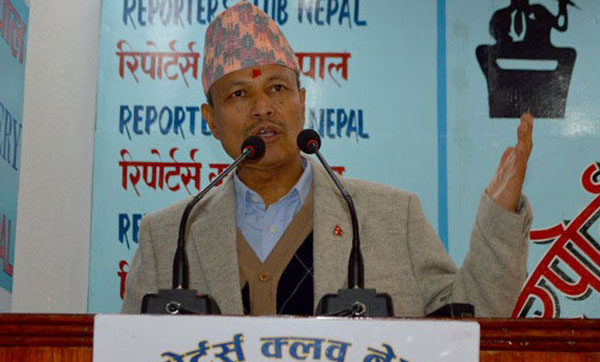‘Army can be mobilised if need arises’
Kathmandu, November 28
Deputy Prime Minister and Minister for Defence Bhim Rawal today said all security forces, including the Nepali Army could be deployed in the Tarai or any other part of the country if deemed necessary.
Speaking at Reporter’s Club, Rawal stated that it was a constitutional obligation to defend the lives of people and ensure national integration.
If any situation that threatens the security of Nepali people and national integrity arises,all security forces, including common Nepali citizens can be mobilised.
Nevertheless, he stated there were no plans at the moment to deploy the army in the Tarai.
“We have rather recalled security forces (army) from the highways and Tikapur in order to create conducive environment for meaningful dialogue with the agitating Madhesi parties,” he added.
Saying that the government had fulfilled all the demands of agitating parties in order to create conducive environment for dialogue, he accused them of spoiling the atmosphere by imposing continuous blockade, setting party offices on fire, attacking vehicles ferrying medicine and ambulances carrying ailing children.
He said the government had paid compensation to the families of those killed during the protests in Tarai and provided free-treatment to those who were injured. According to him, the government had also recalled security forces from the highways and other locations and had even withdrawn cases, except serious ones, to create the right environment.
“On behalf of the government, I ask the protesting parties to stop the disruption of supplies at border checkpoints, stop vandalising vehicles carrying medicine and stop using children in the name of protests and attacking ambulances carrying ailing children and to allow the free transit of vehicles coming from third countries via India to Nepal,” he added.
Rawal, also a vice-chair of the ruling CPN-UML, said the government and his party were ready to address the demand of demarcation of provinces on the basis of population, but stated that the issue of state boundaries was not easy to resolve as demanded by Madhesi parties.
Though the Madhesi parties are raising the issue of forming an “autonomous Madhes Pradesh”
as per the eight-point agreement that was sealed in 2008, Rawal said that province no 2 from Saptari to Parsa itself was a province demanded by Madhesi parties.
“All seven provinces are autonomous, and so is Madhes Pradesh No 2,” he added.
As a key UML negotiator while drafting the constitution, Rawal, however, made it clear that the Madhesi demand of a separate province, that is, from Jhapa to Kanchanpur couldn’t be formed.
Referring to the news that the Indian side had become unhappy after assurances given during the Delhi visits of some key Nepali leaders weren’t reflected in the statute’ Rawal said that no leader could say what a sovereign body like the Constituent Assembly would decide.
“I don’t believe any big neighbour can easily believe assurances visiting leaders give them,” he said. “In a democracy even the views of the majority have to be compromised, leave aside assurances given by a leader,” Rawal added.






